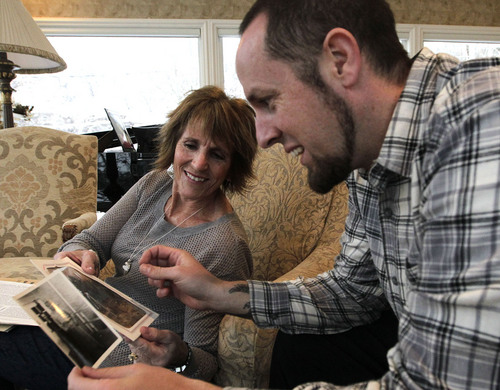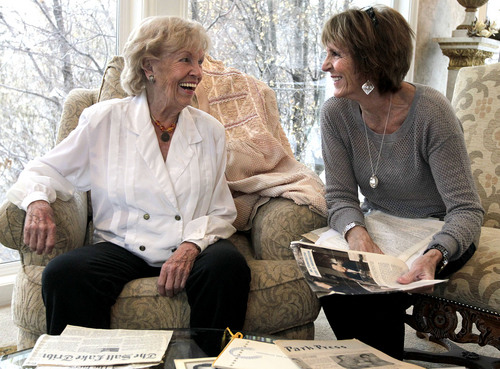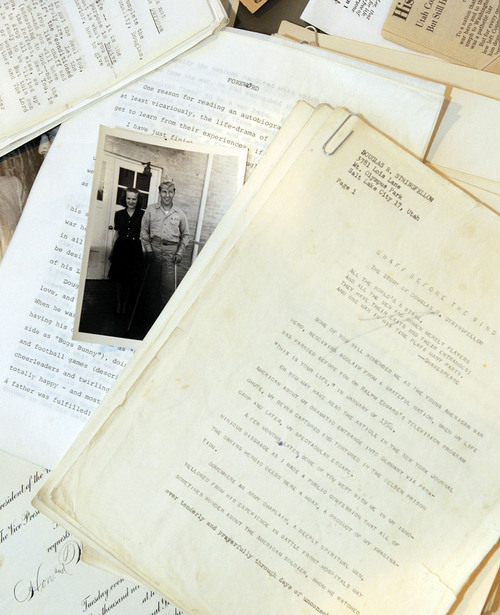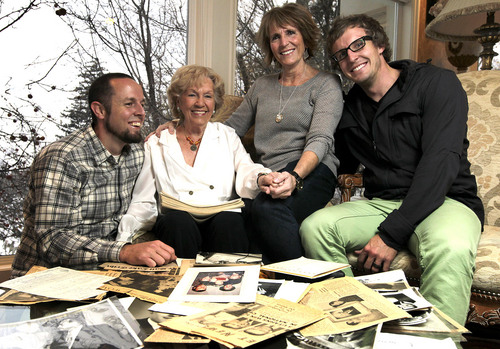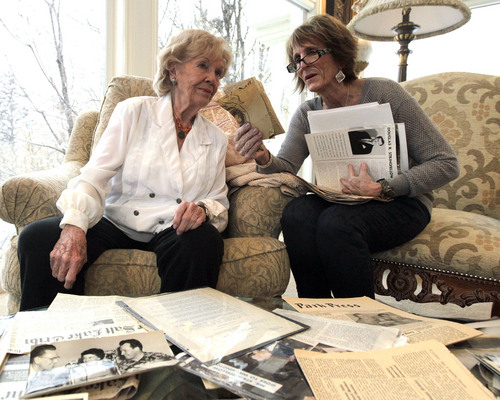This is an archived article that was published on sltrib.com in 2013, and information in the article may be outdated. It is provided only for personal research purposes and may not be reprinted.
The scandal rocked Utah and U.S. politics. Just days before the 1954 election, disabled Rep. Douglas R. Stringfellow, R-Utah, confessed on TV that his oft-repeated stories of war heroics — which propelled him into Congress and attracted national adulation — were false.
Now, 60 years later, an untold side of the story is emerging from an unpublished autobiography Stringfellow wrote but simply boxed up and left largely forgotten before he died in 1966 at a young age, 44.
The bottom line: He really believed his stories were true when he started telling them.
Stringfellow wrote that he realized they were fabrications only after he was elected to Congress as others began to question them. He did not want to admit that publicly, thinking people would see him as crazy. He preferred that they see him instead as a liar.
It all began when Stringfellow was wounded by a land mine shortly after arriving in France as a private in World War II. He lost use of his legs. As he lay for months in the hospital listening to radio reports of the war, he started imagining he was involved in battle feats he heard described. They became real to him and the subject of his nationally popular speeches.
"Given what we now know about the malleability of memory, I would have to say, yes, it is possible that Stringfellow could have developed detailed, coherent, confident and emotional memories of a past that didn't happen," says Kimberly Wade, a psychology professor at England's University of Warwick, who researches false memories.
Roger K. Pitman, a psychiatry professor at Harvard Medical School, says, "This kind of thing is rare. In treating hundreds or thousands of combat-related PTSD cases, I've seen this once before."
Pitman is an expert on PTSD — post-traumatic stress disorder. "To say this 'misremembering' was caused by PTSD wouldn't be correct," he says. "However, it may have been part of his post-traumatic psychopathology."
—
Autobiography • Stringfellow's story comes to light now because of a new scandal — that of recently resigned Attorney General John Swallow. Part of The Salt Lake Tribune's coverage summarized Utah's biggest past political scandals, including Stringfellow's. Publication of that article caused his family to pull out and look at Stringfellow's mostly ignored autobiography of 385 typewritten pages, which his widow once set out for trash before the family rescued it.
"Random House gave him an advance of $20,000 to write it," says Stringfellow's widow, Oneida Lee Lange, who later remarried. "But he sent the money back after he wrote it."
Stringfellow's daughter, Claudia Frendt, says her father felt writing the book had been therapy for himself — and did not want it released to cause his mother to relive a horrible time.
When Stringfellow took his family to Mexico to escape taunting and humiliation in Utah, he set aside the manuscript. "He put it in a box, wrapped rope around it — and never opened it again," Lange says, adding that he wanted to move forward and actually died a happy man.
"This was his outlet because he kept so much of this inside. We think it is important to share it now," says grandson Brighton Jones. Jones' brother, Skyler, adds the book is fascinating because it shows "he's battling his mind."
—
Dawning • Stringfellow wrote that he started to doubt his own war stories after an incident near the end of his first election campaign in 1952. A Republican activist warned him "that some colonel passed through Ogden. You are supposed to have served with him during the war. And he says that you're a phony and so is your story."
Stringfellow wrote, "I assured her there was nothing for them to attack." But he wondered why he felt uneasy and found himself driving for hours to ponder what she said.
"This was the first time, to my knowledge, that my war record had been disputed. It stirred in me a sickening feeling that I had never felt before. It seemed that there was something I should remember — a tenuous something that irritatingly eluded me. I was genuinely frightened."
Expecting a political attack, he recounted his story to aides again with confidence, "How I had parachuted behind German lines; my capture of Otto Hahn, the German [atomic] physicist; how I had been captured and my subsequent escape. As we talked, I gravely examined the scars around my fingernails, a result of the fiendish torture that I had received. ... I could clearly recall the arrogant faces of my Nazi tormentors."
His war record did not become an issue in that 1952 election, which he won by a landslide.
But as time went on, more people questioned his stories. And so did he.
—
Epiphany • Eventually, one night alone on a trip, he decided he must see his war records so "perhaps the blinding fog would lift."
Later that same night, he awoke suddenly shouting, "There are no records!"
He wrote, "Like the bits of glass in a kaleidoscope, my legitimate part in the war fitfully flashed through my darkened mind illuminating the months I had served, as clearly as the events of the preceding day. I had never served in the OSS. I had never been behind German lines."
Stringfellow added, "The sudden recollection of these unvarnished facts was so frighteningly vivid it prompted in me a stinging sensation of always knowing that my service in the OSS was a product of my imagination. It seemed that these facts had always been there, just below the surface of my consciousness. ... I as much as anyone else had been duped by my own story," and fooled even family and friends.
"I just never doubted it," Lange, his widow, says. She was a USO dancer who met Stringfellow as he was recovering in the hospital and says she immediately knew she would marry him.
In his writing, Stringfellow guesses about the cause of the illusions, remembering the lonely months in the hospital when he was mostly paralyzed.
"Without a past to recall, a future to plan and build for, I fled each night to that world of fantasy. ... I roamed the battlefields of the world, conquering the enemy and restoring peace," he wrote. "A news report or a commentator's review of a battle, blaring forth from the radio, could transport me halfway around the world to lead the troops, to rout the enemy."
His daughter, Claudia, says she believes his mind was trying to give meaning to what seemed like a meaningless injury. It grew until he believed he personally saved the war, helping capture the man who could have made a Nazi atomic bomb.
His speeches, when read now, often sound more like nightmares than accounts of real events. He claims, for example, he was forced to walk across pits of burned people who were still alive, who tried to reach up at him while screaming — and he bites a hole through his tongue to keep from crying out. He tells of captors trying to make him talk by torturing his friends, who all die.
—
Decision • Once Stringfellow realized his experiences were illusions, he had to decide to admit it or cover it up. If he admitted it, "Everyone would consider such a story ludicrous, and if they should accept it, would question my sanity."
He wrote, "I visualized a news conference where I would announce that I had suddenly remembered that many of my war experiences were untrue. Such an announcement would be all the proof that was needed that I … was 'off my rocker.' I would be laughed out of Washington. I could not do that to my party or to the future of my children."
So he continued telling stories he knew to be false, including giving paid speeches nationwide.
He even signed a contract for movie rights to his life story.
The end began when he found himself as the surprise guest on the national TV show "This Is Your Life," where friends and even former Army friends extolled his courage and integrity.
"At that moment," he later would write, "I would have bartered my life to have prevented the telecast."
His commanding officer described how he was wounded when he was sent to check on German rocket sites, which was not correct. "I didn't realize that the major was following the script, and for a moment I thought that my memory was playing tricks on me again."
During a commercial, he toyed "with the idea of announcing that the whole story was a hoax, that I was a fraud. But I wasn't capable."
—
Downfall • Soldiers who really did capture Otto Hahn saw the show and knew Stringfellow was a fraud.
As reporters looked into the story, Stringfellow asked President Dwight D. Eisenhower to release CIA records that would vindicate him — knowing they didn't exist but hoping Eisenhower would simply say such records were closed forever. Instead, the CIA looked for them and couldn't find them — informing Stringfellow of that.
Democrats also were looking into the allegations and gave their documentation to LDS Church President David O. McKay. He called in Stringfellow, who denied any falsehood in two meetings in one day.
The Army Times finally broke the story with hard evidence when Stringfellow was giving speeches in Missouri. "I knew the feeling of suicide," he wrote.
He returned to Utah and finally, under questioning by Republican Sens. Arthur Watkins and Wallace Bennett, Stringfellow admitted his stories were false. "Suddenly I was free! I wanted to shout it! It was like a spiritual baptism! I felt flushed out!"
That night, he gave a speech on KSL-TV to say his stories were false.
He did not mention that he once believed them — opting to be seen as a liar rather than "crazy."
He dropped out of his run for re-election just days before the 1954 election, but his last-minute Republican replacement, Henry Dixon, held the seat for his party.
—
Psychology • After Stringfellow's death, Lange earned a doctorate in psychology. She wrote a foreword to his autobiography for her family about what she thinks happened.
"To justify the extreme handicap with which he had returned from the war, he had succumbed to the pressure and psychological need to be a war hero. His imagination provided parts of this story, from something he read, heard, tuned into while unconscious and on medication — who knows?
"He literally 'imagined-in' a total story, sufficiently 'important' to warrant the extent of his injuries. His 'ego' latched on to the attention this story brought him," she wrote.
Wade, the Warwick psychologist, tends to agree.
"It's interesting that Stringfellow has mentioned that he imagined being in battlefields and doing fantastic things. We know that imagination and rehearsal is a key process in developing elaborate false memories."
She adds, "The imagined scenarios could have become fluent, coherent, detailed and rich in color, smell, sound and so on, until ultimately Stringfellow couldn't determine what was imagined and what was real. And that is how false memories occur."
Pitman, the Harvard psychiatrist, says it is probably safe to rule out initial "malingering" — a medical term for lying or exaggerating for financial or other secondary gain — "because he chose to admit to a lie rather than to the delusion."
Stringfellow's grandsons say they hope to find a way to publish the autobiography now. They have been gathering video and interviews with people who knew their grandfather for a possible documentary to go with it. They say it may help other veterans who struggle with war experiences.
Despite his psychological trauma and subsequent public humiliation, they say Stringfellow nevertheless earned a measure of honor.
"He still lost his life prematurely" — his wound contributed to an early death "because he served his country and was injured by a bouncing Betty mine," said grandson Skyler Jones. "He gave his ultimate sacrifice to his country."


